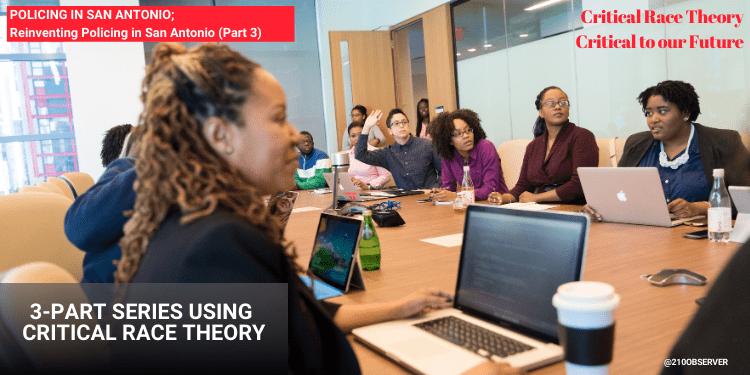Reinventing Policing in San Antonio (Part 3)
During the month of October, our examination of policing in San Antonio has revealed two facts. The first is that people of color are stopped at a disproportionately higher rate than whites in the Alamo City. The second relates to an existing a culture of racism in the San Antonio Police Department. The deaths of Antronie Scott, Thad Demarco Hale, Charles Roundtree, Damian Lamar Daniels, Major Carvel Baldwin, Darrell Zemault, Richard Castilleja, Joe Angel Cisneros, Gilbert Flores in San Antonio have resulted in protests and cries for reform. The United States is a country divided, mainly due to political polarization. If San Antonio is to avoid a similar fate it must conduct a comprehensive assessment of the craft of policing.
Two principles should form the bedrock for effective policing in San Antonio. Firstly, crimes averted, not arrests made, should be the primary metric for judging police effectiveness. Secondly, the opinion of citizens about the police and their tactics for preventing crime and disorder matter independently of police effectiveness. Each principle is important and supported by research evidence. In turn, these two principles should guide twenty-first-century efforts to reinvent policing. I have derived these principles from the “2015 Presidential Task Force on 21st Century Policing” and Lum and Nagin’s 2017 study, “Reinventing Policing in America”. Those seminal works have led to three recommendations that in my opinion are essential steps to reinventing local policing: 1) Prioritize crime prevention over arrest, 2) Create and install systems that monitor citizen reactions to the police and routinely report results back to the public and police supervisors and officers, 3) Reform training and redefine the “culture of policing.”
Cesare Beccaria’s observation made two hundred and fifty-six years ago that “it is better to prevent crimes than to punish them” rings true today. Punishment is costly to all involved: society at large, which must pay for it; the individual who must endure it; and the police whose time is diverted from their crime prevention function. While arrests play a role in the crime reduction function of the police, they also signify a failure of prevention. If crimes are prevented in the first place, so are arrests and all the ensuing costs of punishment. I do not want to imply that police should stop making arrests. An additional important function of the police is to bring perpetrators of crime to justice, as the police certainly cannot prevent all crimes. However, a steady accumulation of evidence over three decades suggests that proactive prevention activities are more effective in thwarting crime than reactive arrests. Proactive policing focuses on people, places, times, and situations at high risk for offending, victimization, or disorder. Proactive policing stands in sharp contrast to reactive approaches in that this style tries to address problems before they beget further crimes through a wide variety of strategies that often do not emphasize arrests.
Trust and confidence are independent criteria for judging police performance. The prime objective of policing should be to create a safe San Antonio/Bexar County, not a safe police state. Police should routinely, systematically, and rigorously survey citizens on their reactions to policing in general and to specific tactics and regularly report results and actions that will be taken to foster favorable citizen responses and remediate negative responses. Maintaining trust and credibility within the community may be tied to the ability of the police to prevent crime and bring perpetrators to justice, however trust may be eroded when police spend too much time arresting individuals for minor crimes or stopping and frisking significant segments of the population.
Officers should be trained and socialized to believe that the fundamental goals of policing include not only arrests of perpetrators of serious crime but also prevention and maintenance of good community relations. Police training, procedures, and metrics of success have been tailored to achieving legality but with little attention paid to their implications for advancing proactive policing or building community trust. Each of the three core functions of police—preventing crime, bringing perpetrators to justice, and maintaining credibility and trust with the public—is significant, but all are highly interdependent. District Attorney Joe Gonzales announced Friday that he plans to create a new division within his office dedicated to reviewing and investigating injuries or deaths caused by law enforcement officers. Follow the Observer for updates to Policing in San Antonio!









